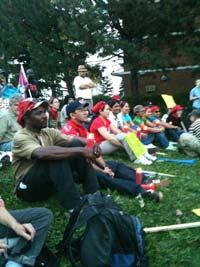Migrant workers march for rights

James Manliclic came to Canada late in 2008 as a Temporary Foreign Worker so he could earn enough money to pay for the schooling of his two daughters in the Philippines.
On June 28, 2009 he was run over at work in Edmonton. His feet and lower legs were crushed. After six months of active treatment, doctors confirmed he will have a lifetime disability, with minimal strength and mobility. He has limited education and job skills.
The Workers Compensation Board in Alberta determined after some months he could handle a sit-down assembly job that pays two-thirds of his previous wages.
However Manliclic cannot take such a job because temporary foreign workers are only permitted by their visas to move to jobs with other employers approved to hire temporary workers. The income loss of this leaves him with too little to support himself and his family in the Philippines.
The case has angered Alberta NDP employment critic Rachel Notley, who said: we are brining temporary workers here, using their labour and throwing them away like a used tissue.”
He called on provincial governments to reveal how many situations like this involving temporary foreign workers have taken place, and to modify their policies to accommodate such workers so they do not suffer economic hardship in addition to the disabilities they are coping with.
Advocates for migrant workers say there are many who face the same predicament like Manliclic.
Last Sunday, in conjunction with Thanksgiving Day migrant workers from the fields, farms and factories of Ontario held a historic march for justice, equality, dignity and human rights.
The journey was aimed at raising attention to the value of the work by migrants in supporting the Canadian economy and their families back home.
“These workers are an essential part of our economy, yet they are subject to lax labour regulations, intimidation, deportation and severe forms of exploitation,” said march organizer Tzazná Miranda Leal.









